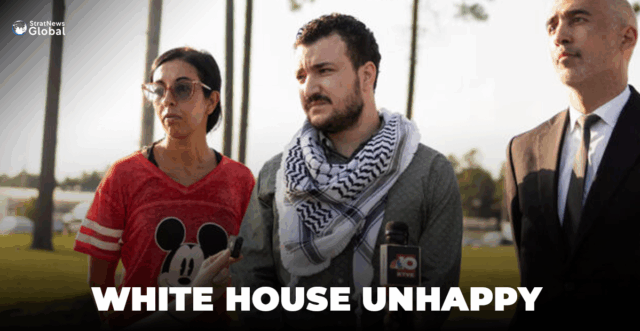Columbia University graduate Mahmoud Khalil walked free from a Louisiana immigrant detention centre on Friday, just hours after a judge ordered his release, marking a significant victory for rights groups who had opposed what they described as the Trump administration’s unlawful targeting of a pro-Palestinian activist.
“Although justice prevailed, it’s long, very long overdue. And this shouldn’t have taken three months,” he said upon his release in the rural town of Jena.
On March 8, Khalil, a prominent figure in pro-Palestinian protests against Israel’s war against Hamas in Gaza, was arrested by immigration agents in the lobby of his university residence in Manhattan. President Donald Trump, a Republican, has called the protests antisemitic and vowed to deport foreign students who took part. Khalil became the first target of this policy.
After hearing oral arguments from lawyers for Khalil and for the Department of Homeland Security, US District Judge Michael Farbiarz of Newark, New Jersey, ordered DHS to release him from custody at a jail for immigrants in rural Louisiana by 6:30 p.m. (2330 GMT) on Friday.
Judge Says Punishment Unconstitutional
Farbiarz said the government had made no attempt to rebut evidence provided by Khalil’s lawyers that he was not a flight risk nor a danger to the public.
“There is at least something to the underlying claim that there is an effort to use the immigration charge here to punish the petitioner,” Farbiarz said, referring to Khalil as he ruled from the bench, adding that punishing someone over a civil immigration matter was unconstitutional.
Khalil is the latest in a string of foreign pro-Palestinian students arrested in the US starting in March who have subsequently been released by judges. They include Mohsen Mahdawi and Rumeysya Ozturk.
Khalil, a legal permanent resident of the US, says he is being punished for his political speech, in violation of the US Constitution’s First Amendment. Khalil condemned antisemitism and racism in interviews with CNN and other news outlets last year.
The Syrian-born activist plans to return to New York to be with his wife, Dr. Noor Abdalla, and their infant son, who was born during Khalil’s 104 days in detention.
“This ruling does not begin to address the injustices the Trump administration has brought upon our family, and so many others,” Abdalla said in a statement. “Today we are celebrating Mahmoud coming back to New York to be reunited with our little family and the community that has supported us since the day he was unjustly taken for speaking out for Palestinian freedom.”
White House Unhappy
The White House condemned the decision to release Khalil, saying he should be deported for “conduct detrimental to American foreign policy interests” and fraudulently obtaining a student visa.
“There is no basis for a local federal judge in New Jersey —who lacks jurisdiction — to order Khalil’s release from a detention facility in Louisiana,” White House spokeswoman Abigail Jackson said in a statement. “We expect to be vindicated on appeal.”
The immigration proceedings against Khalil continue.
‘Doing Their Best To Dehumanize Everyone’
Khalil, wearing a keffiyeh and raising his right fist as he approached journalists outside the detention center, condemned what he called the Trump administration’s racist immigration policies. He said he was leaving behind hundreds of men housed at the detention center who should not be there.
“The Trump administration are doing their best to dehumanize everyone here,” he said outside the gates of the facility. “No one is illegal, no human is illegal.”
Khalil said that his time in detention had changed him.
“Once you enter there, you see a different reality,” he said. “A different reality about this country that supposedly champions human rights and liberty and justice.”
Asylum Request Denied
The Louisiana immigration judge in his case had denied his asylum request on Friday, ruling he could be deported based on the government’s allegations of immigration fraud, and denied a bail hearing. Farbiarz’s decision rendered the bail request moot.
Like others facing deportation, Khalil has avenues to appeal within the immigration system. Farbiarz is also considering Khalil’s challenge of his deportation on constitutional grounds, and has blocked officials from deporting Khalil while that challenge plays out.
Earlier this month, Farbiarz ruled the government was violating Khalil’s free speech rights by detaining him under a little-used law granting the US secretary of state power to seek deportation of non-citizens whose presence in the country was deemed adverse to US foreign policy interests.
On June 13, the judge declined to order Khalil’s release from a detention center in Jena, Louisiana, after Trump’s administration said Khalil was being held on a separate charge that he withheld information from his application for lawful permanent residency.
Khalil’s lawyers deny that allegation and say people are rarely detained on such charges. On June 16, they urged Farbiarz to grant a separate request from their client to be released on bail or be transferred to immigration detention in New Jersey to be closer to his family in New York.
At Friday’s hearing, Farbiarz said it was “highly unusual” for the government to jail an immigrant accused of omissions in his application for US permanent residency.
Khalil, 30, became a US permanent resident last year, and his wife and newborn son are US citizens.
Trump administration lawyers wrote in a June 17 filing that Khalil’s request for release should be addressed to the judge overseeing his immigration case, an administrative process over whether he can be deported, rather than to Farbiarz, who is considering whether Khalil’s March 8 arrest and subsequent detention were constitutional.
(With inputs from Reuters)





